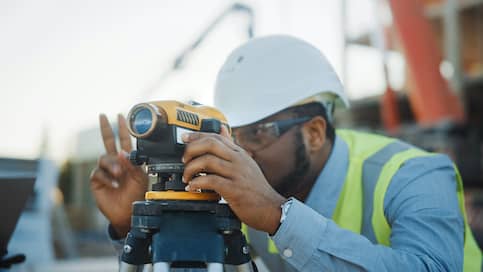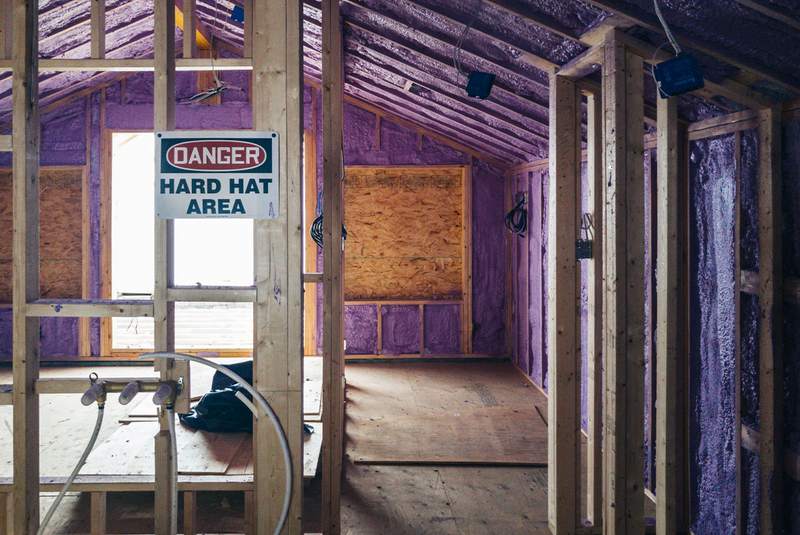Whether you’re a first-time property owner or looking to expand your home, knowing the exact location of your land’s property lines is important. Some property lines are clearly marked by landscape changes or roads, while many are invisible or have changed over time. To gain the most precise understanding of a property, you need a property survey.
Recently found yourself searching “How to find a survey of my property online”? Let’s take a closer look at what property surveys are and why you might want to get one done.
Key Takeaways:
- Property surveys clarify the boundaries of a piece of real estate. They can help you ensure that your property complies with local regulations and prevent legal disputes.
- A comprehensive property survey will include many key details, including property lines, buildings, utilities, easements and access points.
- To determine your property’s boundaries, you can check your deed, search local records or hire a land surveyor.
What Is A Property Survey?
A property survey assesses a particular property’s legal description and its boundary lines. In addition, it makes a determination of easements included in the parcel of land. Although it’s possible to have a property surveyed anytime, reaching a firm conclusion on the land boundaries is key to the home-buying process.
Depending on your mortgage company and where you live, you may need a property line survey to get a mortgage or meet legal requirements. A property survey lets you know what land you’re responsible for and where you can build, while empowering you and your mortgage lender or title insurance company to set the most accurate terms of your agreements.
However, it’s important to note that your property survey doesn’t stop being useful after you’ve secured a mortgage. Having a clear understanding of your property lines has a number of other advantages:
- It can prevent legal disputes.
- It can facilitate future real estate transactions.
- It can help you remain in compliance with local regulations.
Property line disputes are more common than many people realize. Sometimes, the owner of an adjacent property will try to argue about the exact location of the property line, and they may even threaten legal action. If you can produce a property survey, you can politely shut down the dispute before it escalates.
If you decide to sell your home in the future (or even if you want to sell off a portion of your property), having a current survey in place will make the process easier.
Similarly, when you know how to interpret your property survey, you’ll be able to make informed decisions about renovations or other property updates. If you renovate without checking your survey first, you might run afoul of zoning laws or other restrictions.
What’s Your Goal?
Buy A Home
Discover mortgage options that fit your unique financial needs.

Refinance
Refinance your mortgage to have more money for what matters.
Tap Into Equity
Use your home’s equity and unlock cash to achieve your goals.
What Does A Property Survey Include?
There are different types of property surveys, but they all determine important characteristics and features of the land based on what the property owner needs. From ensuring the building meets zoning codes to seeing whether a driveway is in the right place, there’s a type of survey to address a specific need.
Next up are a few examples of what various types of surveys will measure and what the measurements will accomplish for the property buyer.
Property Lines
A precise understanding of your property lines and legal boundaries is essential for a homeowner. By eliminating any confusion or gray areas, you can build or expand your home with confidence and avoid encroachments, or property disagreements with your neighbors.
In real estate terms, encroachment is when a neighbor builds something that invades another neighbor’s property. This type of conflict can easily turn into a legal issue.
Also, you could be liable for injuries or damage related to a structure on your property, even if you didn’t build it. You could also face higher insurance premiums. Finally, some potential buyers may not offer the best price for a property with poorly defined legal boundaries.
Establishing property lines is typically part of an as-built survey, land survey, monumentation survey or mortgage survey.
Buildings And Structures
Determining property lines is important, but it’s not the only part of your property survey that matters. A complete survey will document all buildings on the property. Your home will be included, but so will sheds, garages, barns and other outbuildings.
When your property survey captures the dimensions and locations of these structures, it will give you and anyone else reading the survey a complete picture of the property.
Easements And Access Points
A property survey will reveal any easements on the property you want to purchase. An easement may require you to share access to some part of your property. For example, a utility company could have the right to install electrical wires on your land, or you may be required to share a private road or beach with your neighbors.
There are many different types of easements, and they’re not always a problem. It’s just better to know about them so you’re not caught by surprise.
Similarly, your property survey will also record any and all access points, which are ways that people and vehicles can enter and exit the property. Driveways and walkways are among the most common types of access points.
Topographical Characteristics
Topographical surveys map the contours, elevation and features of a property. This type of survey will include your property’s exact elevation, building type and flood map location to determine the proper flood insurance premium.
This information is important for architects and building contractors. It can also impact the design and cost of any new structure you decide to build. Paying for a topographical survey and a flood certificate now could end up saving you hundreds of dollars per year.
Topographical surveys are useful for more than just determining your risk of flooding. They also note hills, slopes, lakes, streams and other features.
Being able to see the topography of your property is essential for planning any kind of major construction. For example, if you want to build a workshop on your land, you could use the survey to pick the flattest piece of terrain available.
Utilities And Services
If you want to build a backyard pond or otherwise need to dig on your property, always consult your property survey first. A complete survey will show the locations of underground pipes and cables so you can avoid them (and save yourself costly repairs).
Hazard Areas
The fieldwork a property surveyor does on a plot of land can uncover potential problems and hazard areas. This is especially important if you plan to build new structures on your land.
A thorough survey from an accredited professional can help you avoid costly mistakes, like trying to build your new home and finding that your lot has a water table near the surface or leaving your lot at risk of incurring future damages from land erosion, landslides or earth collapse.
Floodplain surveys focus on one type of hazard, which can help property buyers in areas prone to flooding.
Ready To Become A Homeowner?
Get matched with a lender that can help you find the right mortgage.
How To Confirm The Boundaries Of The Property
Wondering how to obtain a survey of your property? There are several ways to confirm the legal boundaries of your plot of land. Let’s explore a few.
Hire A Land Surveyor
A professional land surveyor is an expert in defining property lines. They use their skills, education and specialized field equipment to create legally binding property surveys. They can even serve as expert witnesses in court cases about land disputes.
During the property survey, a land surveyor will compare historical records and data with any existing markers to accurately define your property lines – and their findings are legally binding.
This process takes time, effort and boots-on-the-ground legwork, so hiring a well-respected and well-reviewed land surveyor before purchasing land or beginning any new home expansions is your best bet to avoid future legal issues.
It may be tempting to run a quick search for “land survey near me” and pick the least expensive surveyor who comes up. By focusing only on cost, however, you may unwittingly hire someone who isn’t qualified. If their work is called into question in the future, you may end up spending more on legal fees than you would have if you’d hired a competent surveyor in the first place.
Here are a few tips for finding a capable surveyor:
- Ask friends and family for referrals.
- Read reviews online to get a sense of past client experiences.
- Get quotes from at least three surveyors before committing.
- Verify the state license number of each surveyor you consider.
- Verify the surveyor’s insurance.
- Talk to each candidate to make sure they’ve surveyed similar properties.
There’s nothing wrong with trying to find an affordable surveyor. However, you should be wary of any too-good-to-be-true low estimates.
Check The Property Deed
If you’re not already familiar with property-related terms, you may be wondering about the difference between a deed and a title. A title is your legal right to ownership of the property, but it isn’t a physical document. A deed, on the other hand, is a legal document showing that you own the property.
A property deed will have several pieces of important information: accurate owner names, exact address, tax map number, legal description, restrictions and other information like conditions of the transfer and reservations of rights by a prior owner. While some deeds only reference a lot or block number, many include detailed measurements in the form of – yep, you guessed it – a property survey done by a land surveyor.
While some property deeds will include a complete property survey, others may simply denote the legal bounds of your property. Typically, deeds must include a legal description of the property. This description must be detailed, but it usually doesn’t have to be accompanied by a survey, map or other picture of the property itself.
Search Property Survey Records
While there’s no national archive of real estate records, many states require property surveys to be filed with the local government. You might be able to view past surveys by accessing your county clerk or county assessor’s website.
If you’re not having any luck online, it might be worth a trip to your county clerk or county assessor’s office. These offices typically maintain physical copies of property records. There’s no guarantee that your county office will have a survey for your property, but if they don’t, they may be able to point you in the right direction.
You’ll need to manually check transfers, requirements and restrictions on the property. This avenue can be time-consuming, but it’s a free to low-cost way to empower yourself with the knowledge and history of your new property’s legal boundaries.
Find A Property Survey Online
Many local governments keep property records online. However, each local government decides how it maintains those records (and determines how easy they are for property owners to access).
Don’t waste time searching, “How to find a survey of my property online.” Here are two different places you might consider looking first:
- Your local government’s website
- Geographic Information System (GIS) property records
In many cases, your local government website is the easiest place to begin your search. Many governments keep an online database of property records, and you can typically search by either address or property ID. If you aren’t sure of your property ID, your property tax bill should include it.
Your local government may also have a GIS portal where you can view property records, including past property surveys. Searching for “[city or county name] GIS” is usually the best way to find the portal.
Contact The Previous Surveyor
If you’re wondering, “Where do I get a copy of my land survey?” and haven’t had any luck finding one elsewhere, it may be a good idea to reach out to the previous surveyor.
Land surveyors keep copies of the property surveys they complete (legally, the survey belongs to them). If you know the name and contact information of the previous land surveyor, try contacting them.
It’s likely that they can send you a copy for a fee. However, that fee will generally be far less than what it would cost to have an entirely new land survey done.
Land surveys are usually valid 5 to 10 years after they’re completed. If the previous survey was done a long time ago, it’s probably a good idea to get a new one done, even if you locate the official document.
Take The First Step To Buying A Home
Find a lender that will work with your unique financial situation.
How Much Does A Land Survey Cost?
On average, new homeowners can expect an average cost of $376 – $745 for a professional property survey. However, survey cost depends on factors such as property size, terrain and location. For example, if you want to survey a wooded area, you’ll end up paying more than if you surveyed a flat, relatively empty piece of land.
Professional surveyors also charge for the time it costs them to research your property. A well-documented plot of land won’t take as much time to research, and surveying it will be cheaper. It also pays to go local, since travel time is included in the final price.
In sum, you’ll pay less when the land isn’t as difficult to survey.
Property Survey FAQ
Still unsure how property surveys work or if you need one? We’ve answered a few frequently asked questions.
The Bottom Line: A Real Estate Survey Can Help With Encroachment Issues
Property surveys are an important part of the home-buying process and are usually paid for by the buyer. It’s possible to find information on your property lines without conducting an official property survey, but you won’t end up with an official document, and you can’t use your findings as part of a property sale or legal dispute.
The best option here is acquiring the services of a property surveyor who’s a licensed professional, but the cost will vary depending on the type of land you want surveyed.
Planning to add onto your property? See if a cash-out refinance can help fund your next home improvement project.

Ben Shapiro
Ben Shapiro is an award-winning financial analyst with nearly a decade of experience working in corporate finance in big banks, small-to-medium-size businesses, and mortgage finance. His expertise includes strategic application of macroeconomic analysis, financial data analysis, financial forecasting and strategic scenario planning. For the past four years, he has focused on the mortgage industry, applying economics to forecasting and strategic decision-making at Quicken Loans. Ben earned a bachelor’s degree in business with a minor in economics from California State University, Northridge, graduating cum laude and with honors. He also served as an officer in an allied military for five years, responsible for the welfare of 300 soldiers and eight direct reports before age 25.












